
Tan France welcomes second baby with husband Rob France via surrogate
Queer Eye star Tan France and his husband Rob France have welcomed their second baby together via surrogate. The 39-year-old reality TV star confirmed the birth of their son, Isaac, on Instagram. “Welcome baby boy #2, Isaac France, born this past weekend. He completes our little family perfectly,” he captioned the post, which featured the new family of four. The Next in Fashion host also shared his thanks for their surrogate, writing, “And a huge thank you to our incredible warrior of a surrogate, for giving us the greatest gift one could ever give.” In the comments, France’s fellow Queer Eye co-stars rushed to congratulate the couple on their newest addition. Bobby Berk wrote, “My babies havin babies,” while Karamo Brown said: “So happy for the world to meet your new beautiful baby!!! What a blessed family!” “Awee Tannay!!!! Cutest family,” commented Jonathan Van Ness. France announced on 13 April that he and his illustrator husband were welcoming a new addition to their family summer. In August 2021, the parents welcomed their eldest son, Ismail, who was born prematurely. In a video clip posted to Instagram, France revealed that the couple have been wanting to expand their family for a “long time”. “Hard to believe it was two years ago today we announced Ismail was on his way! And today – we couldn’t be prouder to share that he’s going to be a big brother!” France captioned the post. “Becoming dads has been our greatest joy, and we are so excited to grow our family with the help of our wonderful surrogate.” The British-American fashion designer previously recalled the moment he and his husband learned their surrogate was pregnant last December. “We were over the moon,” France said in an interview with People in April. “It was the best feeling ever. I mean, it felt almost as shocking as the first time. I was overjoyed, in tears, I couldn’t believe that it had finally happened again. It was just the most incredible feeling.” France explained that the couple decided to have another child because they wanted their son Ismail to have a built-in best friend that was also close in age. "We wanted him to have someone that will be his person that he’s tethered to,” France told the outlet. “I’m really close with my siblings and my husband is really close with his, so we wanted to create a family where [our child] would have more support other than just Rob and I.” He added the most exciting part about expecting another baby is that Ismail will “have somebody hopefully for the rest of his life that he gets to call his person”. While he revealed that the couple already know the sex of their unborn baby, they won’t be sharing it with fans just yet. However, the two have already picked out a name for baby number two. Speaking to People, France also gave insight into the couple’s “wonderful” relationship with their surrogate, whom he praised as an “incredible woman.” “The only thing that’s different is that she’s out of state,” said France, who lives in Salt Lake City, Utah. “So we don’t get to see her in real life as much, but we see her on FaceTime or Zoom. We text regularly, and so it’s been great.” In August 2021, Tan France and husband Rob welcomed their eldest child Ismail seven weeks earlier than his due date. The newborn spent three weeks in the NICU (newborn intensive care unit) before he was taken home. “Give our son a warm welcome,” France captioned a photo of the parents smiling with their son. “Ismail France, born July 10th.” “He came seven weeks early, so he’s been in the NICU for the past three weeks,” he wrote. “But, today, we finally got to bring him home. We love him so, so much. Like, fully obsessed.” France added that their surrogate was “doing so great” post-labour and they “couldn’t be more grateful for the greatest gift in our lives.” Read More Tan France reveals his grandfather used to make knockoff Disney products Queer Eye’s Tan France welcomes first child after surrogate gives birth seven weeks early Queer Eye’s Antoni Porowski engaged to boyfriend Kevin Harrington How a hay fever medication transformed my life Dermatologist horrifies viewers by discussing mites that live in your skin ‘Unsupportive backgrounds’ make LGBT+ youth twice as likely to have suicidal thoughts – report finds
2023-06-01 21:58
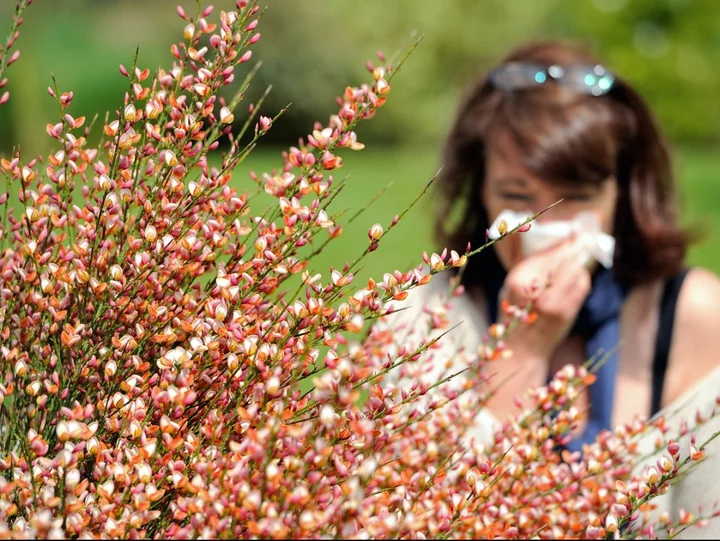
How a hay fever medication transformed my life
Spring has always been a transformative season for me. As the the weather improves, so, too, does my mood. But there has always been one thing that makes the move from winter much, much worse: my hay fever. Like one in 10 children and one in four adults, according to the Met Office, I have always suffered with hay fever. With that number rising year on year too, it’s likely that if you don’t get symptoms yourself, you’ll know someone who does. For me, the worst symptom has always been unbearably itchy, watery eyes, although the constant sneezing isn’t that much fun either. Other symptoms include itchy mouth, ears and throat, coughing, a blocked nose and many more. For a few years I took prescription strength Loratadine (Clarityn), which worked for a while, up to a point. The symptoms reduced but I was always able to tell when it was a day with high pollen in the air because my eyes would still itch and the sneezes would come and go. If it was the best the doctor could do, then I’d just have to put up with the remaining symptoms, which were reduced. Eventually, Loratadine stopped being as effective. I mentioned it in passing to my GP when I was there for an appointment about something else. “We’ll try something different,” she said. Enter Fenofaxidine. It seems too much to say that Fenofaxide changed my life but, in hay fever terms, it was a total gamechanger. The medication stopped my symptoms instantly. No more sneezing, no more itchy eyes, no more hay fever. Obviously, I’m not a medical professional but it didn’t stop me telling everyone I know with hay fever to speak to their doctor about it. My mum, also a lifelong sufferer, saw the same effects as I did. So when I saw an advert last year for Allevia (a brand name for over-the-counter Fenofaxidine), I knew the potential its declassification could have on hayfever sufferers in the UK. I wasn’t surprised when it sold out after going viral on TikTok last year. One review said: “This actually works. I’m impressed. My eyes are not bulging because they are itching. I feel good, I can enjoy the sun,” she said. Hay fever isn’t life or death, nor should it be treated as such, but for someone whose mood is so dramatically increased by spending time outside it has made quite a big difference to me – the simple pleasure of being able to enjoy the sun. Read More The popular £4 hay fever tablet that ‘cures all symptoms’ Festival checklist 2023: Camping gear, clothing, beauty and more essentials Why do we get hay fever and what are the symptoms?
2023-06-01 21:52

‘Unsupportive backgrounds’ make LGBT+ youth twice as likely to have suicidal thoughts – report finds
Young LGBT+ people who weren’t supported at home and school are more than twice as likely to have had suicidal thoughts and feelings than supported peers, a new report has found. Those from unsupportive backgrounds are also nearly twice as likely to have self-harmed, nearly half as likely to say they are happy in adulthood (43% vs 85%), and more than three times as likely to ‘never or rarely’ feel optimistic about their future – according to the findings from Just Like Us. The LGBT+ young people’s charity surveyed 3,695 people aged 18-25, including 1,736 LGBT+ young adults from across the UK. The ‘Positive Futures‘ report also found unsupported young LGBT+ people were significantly more likely to have experienced panic attacks and depression. What does an ‘unsupportive background’ mean? “An unsupportive time growing up can look like being bullied at school, never hearing that it’s OK to be LGBT+, facing family rejection and even estrangement, and not having any role models to look up to – all simply because you are LGBT+,” Amy Ashenden, Just Like Us interim CEO, told PA Media. “Sadly for lots of LGBT+ young people today, that remains a really gruelling reality. When we look at the research findings, we can see it’d be foolish to think growing up LGBT+ is not still incredibly tough.” How can you help support young LGBT+ people? Ashenden added: “Anyone who cares for and about young people has a role to play – whether or not you think they might come out as LGBT+ one day. We are calling particularly on parents, guardians and teachers to be more vocal in their support for LGBT+ people from the outset. “From the research, we know that LGBT+ young people wish they’d had these conversations from nursery age, which simply looks like saying: LGBT+ people exist and I support them. I’m proud to be an ally. “As a parent, you could mention a TV character or a person you know who is LGBT+ and you could mention how you admire their courage to be out and proud, or talk to them about how they are free to be who they are, different gender expressions included, and that you don’t agree with the harmful things sometimes said about trans people,” Ashenden said. Listening without judgement If a young person tells you they’re worried about coming out as LGBT+ and you’re unsure how to respond, remember there can be great value in just being a supportive listener. “The most important thing when a young person feels vulnerable or scared about coming out is providing a safe and supportive environment for that person to share their feelings, and to help them overcome their anxieties,” said Robert Common, an LGBT psychotherapist and founder/group CEO of The Beekeeper House. “Your role is to listen, and to allow them to express themselves without fear of judgement. You don’t need to be there to offer solutions – and be mindful of giving advice you’re not sure will be helpful or effective. You should remind them that they aren’t alone; there are many support groups and resources out there to help them.” Common added that ‘coming out’ isn’t just one conversation, either. For some young people, there may be anxiety about whether they will be accepted. “There’s a misconception that coming out is one big momentous point in time, but in reality, it’s a process. Although it shouldn’t be this way, the journey of acceptance can take a long time for some individuals, including family,” Common explained. “Young people in this situation should know that they should always come out on their own terms, whilst prioritising their safety and wellbeing. “If they do feel at risk from coming out to family, [gently encourage] them to talk through what the risks might look like and how to make contingency plans if they are faced with any kind of negative reaction or discrimination.” Signposting and community If a young LGBT+ person needs support and is facing difficulties, there are organisations that can help. Signposting them towards these can be a helpful step. For example, Common suggested: “The Albert Kennedy Trust (akt.org.uk), for LGBT young people who are homeless or living in a hostile environment. They can help with finding emergency accommodation as well as employment, education and training for those who need to support themselves.” Finding community can also be helpful – and “crucial for individuals that feel isolated or alone”, Common added. “The LGBTQ+ community is diverse, so when speaking to someone coming out, you can encourage them to see which parts of that community they identify with and relate to the most.” Many mental health charities like Mind (mind.org.uk) also offer specific advice for LGBTQ+ people, and the LGBT+ anti-abuse charity Galop (galop.org.uk) can provide support to those who have experienced violence or abuse. Read More Charity boss speaks out over ‘traumatic’ encounter with royal aide Ukraine war’s heaviest fight rages in east - follow live As Pride Month begins: 5 LGBTQ+ icons who have helped shape pop culture and history 10 ways to explain dementia to children How to make your home summer ready
2023-06-01 20:29

Dermatologist freaks viewers out after ‘catching’ mites that live in pores
A dermatologist has shared a video about the eight-legged mites called Demodex that live in our pores, which viewers have found either alarming or insightful. Dr Scott Walter, who is based in Denver, Colorado, posted a clip to the social media platform TikTok, in response to a prompt that asked: “What is something you found out late in life you should have known earlier but just didn’t?” Dr Walter’s first video, posted earlier this month, explained what the Demodex mites were. He began his video by describing them as “eight-legged creatures living inside the pores of your face right now”. The microscopic mites live in hair follicles and oil glands on the face, neck and chest, and feed on sebum and oil produced by pores. They are generally harmless, but too many can cause irritation and infection in the skin. Dr Walter has since posted two more videos about the mites after viewers were shocked and disgusted upon learning of their existence. In one video, he “catches” several mites that live on his own face and puts them under a microscope. The dermatologist explained that the Demodex mites live in “everyone’s faces”, adding: “Some people have more than others and that’s what [is] thought to contribute to the pathogenesis of rosacea.” Rosacea is a skin condition that occurs when round red spots and pustules appear on the face. Other symptoms include burning and stinging sensations, permanent redness and small blood vessels in the skin becoming visible. @denverskindoc ♬ original sound - Dr. Scott Walter MD | Derm Dr Walter continued: “Don’t believe me? I’m going to try and catch some of my own, like a Pokemon, next week and show you under the microscope.” The clip has been watched more than 10.5m times since he posted it and garnered thousands of comments from people who were thoroughly freaked out by the information about Demodex mites. “My whole face itches, how to get rid of them please?” one person asked. Another added: “This is one of those things I would’ve been fine not knowing about.” In a follow-up video, Dr Walter apologised for bringing viewers’ attention to the existence of Demodex mites. @denverskindoc Replying to @voice_of_hers can you treat Demodex? Here's how we do as dermatologists... But not everyone needs to treat it! #demodex #demodexmite #rosacea #folliculitus #todayilearned #newfriends ♬ original sound - Dr. Scott Walter MD | Derm “I am sorry I told you about Demodex,” he said. “Is your whole face itchy because of them? Probably not. But can you treat them? Yes.” He added that the mites also lay eggs on the skin and they can hatch even after treatment. “They’re our friends,” he said. “Accept them. They’re here to stay.” However, concerned viewers can treat Demodex mites if they have skin conditions like rosacea or severe folliculitis, which is when hair follicles become inflamed. Dr Walter pointed to topical treatments such as metronidazole, topical ivermectin, sulfer sulfacetamide washes and permethrin, as well as oral therapies that are used in more severe cases. His most recent video showed him fulfilling his promise to “catch” Demodex mites living on his own face and revealing them under the microscope. @denverskindoc Replying to @kaaat0709 Even I was not fully prepared for this: Demodex Mites: can I catch them all?! #demodex #demodexmite #rosacea #nerdingout #dermatologist #microbiology ♬ original sound - Dr. Scott Walter MD | Derm He did so by placing cellophane tape across his forehead and nose before going to sleep. The following day, he placed the stripes of clear tape under the microscope, which revealed three Demodex mites that had been living in his pores. Speaking over the video, he zoomed into one of the mites and said: “That right there is a Demodex mite and I’m kind of freaked out that I actually have them.” He zoomed in even further and showed the mite moving some of its legs, which indicated it was still alive. According to WebMd, small numbers of Demodex mites living in the skin can be beneficial as they remove dead skin cells and extra oil. People with skin conditions that cause irritation and inflammation should consult a dermatologist before beginning any treatments. Read More Fans praise Jay-Z for his dancing as daughter Blue Ivy takes the stage at Beyoncé’s concert Parents defend Nick the Fairy Godmother’s apprentice at Disneyland after viral video Woman stunned by response after putting her credit score on Hinge profile Dermatologist horrifies viewers by discussing mites that live in your skin ‘Unsupportive backgrounds’ make LGBT+ youth twice as likely to have suicidal thoughts – report finds The £4 hay fever tablet that ‘cures all symptoms’
2023-06-01 20:15
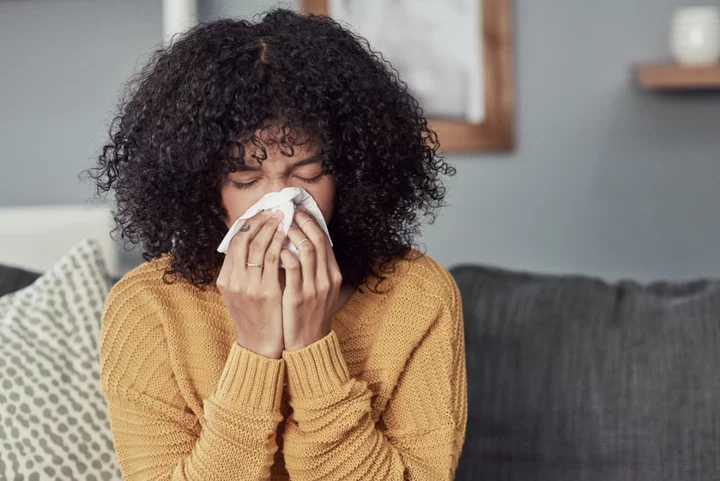
The popular £4 hay fever tablet that ‘cures all symptoms’
A brand of over-the-counter hay fever tablets are likely to be popular this summer after they were hailed a “miracle cure” by social media users. Several videos made by TikTok creators have recently gone viral after they discovered that Allevia, an antihistamine that retails for as little as £4, could relieve them of hay fever’s symptoms, which include sneezing, a runny nose, itchy eyes or throat and more. The tablets, which claim to provide relief from symptoms for 24 hours, were previously only available on prescription but were re-classified to general sales status by the UK’s Medicines and Healthcare products Regulatory Agency in December 2021. They are now available in most supermarkets and pharmacies. How is fexofenadine hydrochloride used? The active ingredient in the tablets is fexofenadine hydrochloride, which works by blocking the effects of histamine in the body, subsequently reducing symptoms such as itching and sneezing. Is Allevia any good? One TikTok user who was previously struggling with hay fever said all of her symptoms were “completely gone” after taking the tablet. Another shared an in-depth review of the effects of the tablets after a full day. After five hours of taking the medication, she said she hadn’t sneezed once. “This actually works. I’m impressed. My eyes are not bulging because they are itching. I feel good, I can enjoy the sun,” she said. She gave another update eight hours after taking the tablet, telling viewers that she had been out all day “around nature and plants” and still showed no symptoms. @tianarene1 it worked for me, but lmk your experience! Always read the leaflet to be safe! #allevia #alleviareview #hayfevertablets #hayfeversymtoms #hayfever ♬ original sound - Tiana René One Twitter user said: “Allevia has changed my life, what a drug.” “I have gone from having the worst hay fever you will ever see anyone have in your whole life, to feeling like I’ve never had it. Allevia, you have cured me,” a third person said. The popular tablets are stocked in most of the UK’s popular supermarkets, including Asda, Tesco, Morrison’s and Sainsbury’s. They are also available in Boots and Superdrug. Side effects of Allevia include headaches, dizziness, nausea and drowsiness. Read More Triathlete proudly shares ‘beautiful’ racing photo where she bled through swimsuit while on her period A Place In The Sun’s Jonnie Irwin admitted to hospital amid terminal diagnosis Parents defend Nick the Fairy Godmother’s apprentice at Disneyland after viral video Schoolboy almost dies from swallowing magnets for TikTok challenge Woman shares honest review of New York City apartment TikTok mom slammed after making 5-year-old son run in 104 degree heat
2023-06-01 18:19
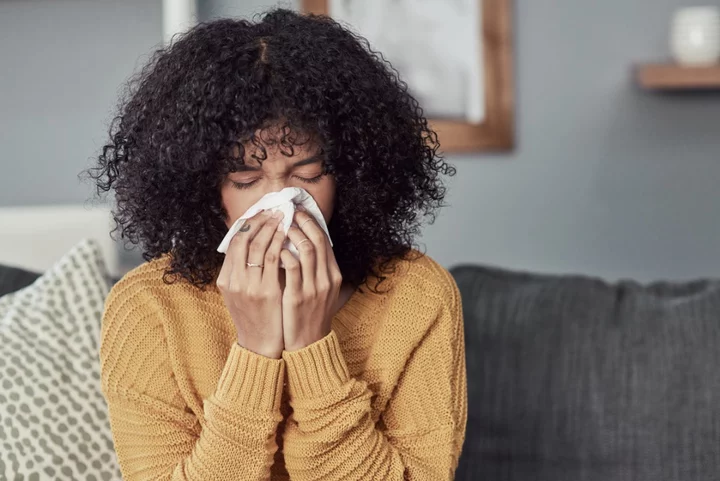
A £4 hay fever tablet which ‘cures all symptoms’ is selling out
A brand of over-the-counter hay fever tablets are quickly selling out after being hailed a “miracle cure” by social media users. Several videos from TikTok creators have gone viral in the past week after they discovered that Allevia, an antihistamine that retails for as little as £4, could relieve them of hay fever’s symptoms. The tablets, which claim to provide relief for 24 hours, were previously only available on prescription but were re-classified to general sales status by the UK’s Medicines and Healthcare products Regulatory Agency in December 2021. The active ingredient in the tablets is fexofenadine hydrochloride, which works by blocking the effects of histamine in the body, subsequently reducing symptoms such as itching and sneezing. One TikTok user who was previously struggling with hay fever said all of her symptoms were “completely gone” after taking the tablet. Another shared an in-depth review on the effects of the tablets after a full day. After five hours of taking the medication, she said she hadn’t sneezed once. “This actually works. I’m impressed. My eyes are not bulging because they are itching. I feel good, I can enjoy the sun,” she said. She gave another update eight hours after taking the tablet, telling viewers that she had been out all day “around nature and plants” and still showed no symptoms. @tianarene1 it worked for me, but lmk your experience! Always read the leaflet to be safe! #allevia #alleviareview #hayfevertablets #hayfeversymtoms #hayfever ♬ original sound - Tiana René The popular tablets are stocked in most of the UK’s popular supermarkets, including Asda, Tesco, Morrison’s and Sainsbury’s. They are also available in Boots and Superdrug. Due to high demand, at the time of writing they are sold out on the Boots, Asda and Tesco websites. People have also praised the effects of Allevia on Twitter. “Those that suffer from hay fever, stop using the Piriteze tablets and buy Allevia tablets – it will stop your sneezing or throat itching within seconds,” one person wrote. Another said: “Allevia has changed my life, what a drug.” “I have gone from having the worst hay fever you will ever see anyone have in your whole life, to feeling like I’ve never had it. Allevia, you have cured me,” a third person said. Side effects of Allevia include headaches, dizziness, nausea and drowsiness. Read More Schoolboy almost dies from swallowing magnets for TikTok challenge Woman shares honest review of New York City apartment TikTok mom slammed after making 5-year-old son run in 104 degree heat The £4 hay fever tablet that ‘cures all symptoms’ 6 mouth cancer symptoms everyone should know Breast cancer symptoms and survival rate as Amy Dowden diagnosed
2023-06-01 18:18
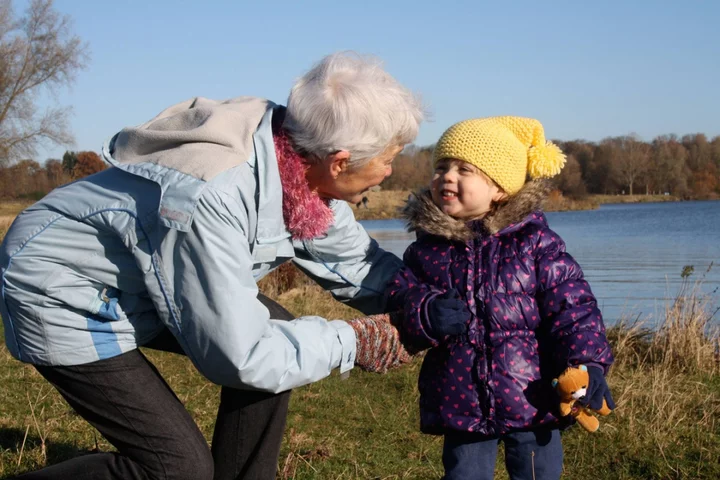
10 ways to explain dementia to children
Dementia is very hard for adults to understand – so imagine how perplexing it must be for a child. Not only does a close family member like their grandma or grandpa start forgetting things, but dementia – the most common form of which is Alzheimer’s – can mean those affected have problems with planning, decision-making and language, as well as changes in their mood and behaviour. And they’re only going to get worse. But how do you explain all this to a child? “Finding out someone close to you has dementia is difficult for everyone, and we all need time to adjust and come to terms with our feelings,” says Dr Tim Beanland, head of knowledge management at the Alzheimer’s Society. “Children and young people are no different, but it can be harder for them, as they may not properly understand what dementia is, or they might find it harder to cope with their feelings. “One of the most important approaches is to listen to the concerns of the young person or child. It’s very important to try to get a sense for how much they can cope with, and tailor the discussion accordingly.” Here are Beanland’s suggestions for how to explain dementia to a child… 1. Explain what dementia is Make sure you know the facts about dementia, and convey at least some of what you know to your child, in an age-appropriate manner. “Explain as clearly and calmly as possible, at a level that the child can understand,” advises Beanland. “Try to get a sense of how much detail they can cope with.” 2. Be clear and honest Try to be as honest as you can, offering clear explanations and plenty of reassurance, Beanland says. “It’s important to make sure they know they can ask questions any time they need to.” 3. Acknowledge the affected person’s behaviour Talk about the behaviour of the person with dementia, for example if they’re forgetting where they are, or not recognising family members, says Beanland. Make sure your child knows you understand the behaviour may seem strange to them. 4. Listen carefully to what children have to say Try to imagine the situation from your child’s point of view, suggests Beanland. “Think about their relationship with the person with dementia – this will help you find out if they’re worrying about something specific,” he says. 5. Be patient You may need to repeat your explanations on different occasions, depending on the age and level of understanding of the child. 6. Tell the school If your child is at school, it’s often a good idea to let staff know that your relative has dementia, says Beanland. That way, if the child’s behaviour is affected at all by what’s happening with their relative, teachers may realise what’s triggering the behaviour. 7. Remind children you’re still there for them It’s important to reassure children that others are still there for them, says Beanland. “They need to know that, despite all the pressures, they are still loved – however preoccupied or frustrated other people may be sometimes.” He says this can help to provide opportunities for them to talk about any concerns they might have. “Give the child plenty of reassurance and hugs, and don’t be afraid to use humour, if it feels appropriate,” Beanland says. “It can help if you can laugh together.” 8. Get the person with dementia to talk to the child about their diagnosis if possible If the person with dementia has received an early diagnosis, or has a form of dementia that doesn’t initially affect their understanding and communication, they may be able to talk about their diagnosis to a child themselves. “This can potentially be a good way of reducing fear and maintaining a positive relationship,” says Beanland. 9. Let them know you are there Encourage the child to ask any questions they have, and let them know they can always talk to you without being judged. “You could also set aside a regular time to talk or do activities together when they can speak with you alone,” suggests Beanland. 10. Talk about living well with dementia Once you’ve explained as well as you can what dementia is and what’s happening to your loved one, try to be positive about their remaining abilities. “Focus on the things that the person with dementia can still do, as well as those that are becoming more difficult,” Beanland suggests. Read More Charity boss speaks out over ‘traumatic’ encounter with royal aide Ukraine war’s heaviest fight rages in east - follow live How to make your home summer ready Jetting off this summer? Doctors share essential in-flight health tips How do heterosexual celebrities become LGBTQ+ icons?
2023-06-01 15:49

Khloe Kardashian says what she thought was a zit turned out to be melanoma
Khloe Kardashian has revealed that what she thought was a zit on her face turned out to be melanoma. Kardashian, 38, and her family navigate the implications of the diagnosis during the latest episode of The Kardashians, a Hulu series that follows the high-profile members of the celebrity Kardashian-Jenner family. “Khloe has a little bit of a history with melanoma and cancerous lesions, so this on her face is very concerning to me,” Khloe’s mother Kris Jenner, 67, says to her step-sister Kylie Jenner, 25, during the episode. Kylie responds that her older sister had “this little bump and she was trying to remove it, and she’s like, ‘it just won’t go away,’ so to find out it’s melanoma is obviously really scary and I just hope that everything’s gonna be OK.” Kardashian decided to have a biopsy on the bump on her face, despite thinking it was a “zit”. “I have done one biopsy on this bump that I just assumed was a zit, turns out it’s not a zit,” she says during the episode. “It’s melanoma and for my age, it’s incredibly rare.” Melanoma is a type of skin cancer that can spread to other areas of the body, according to the NHS. The main cause of melanoma is ultraviolet light, which comes from the sun and is used in sunbeds. “Melanoma is deadly,” Kardashian said in a trailer for the show. “This is way more serious than I anticipated it to be.” Factors that increase the chances of getting melanoma include age and having pale skin, a large number of moles and a family history of skin cancer. Karshasian first opened up about her skin cancer scare in October 2022 and shared the news on her Instagram Story, featuring close-up photos of her skin. She said at the time that she was “grateful” that the margins now “appear clear” and she was in the “healing process”. “So, here we are… you’ll continue to see my bandages and when I’m allowed, you’ll probably see a scar (and an indentation in my cheek from the tumour being removed) but until then I hope you enjoy how fabulous I’m making these face bandages look.” Kardashian also urged her followers to get frequent checkups by recounting a past incident where doctors found a cancerous mole on her back. “At 19 years old, I had melanoma on my back, and I had a surgery to remove that as well, so I am pre-composed to melanomas,” she said of that experience. “Even those who are not, we should be checking all the time.” “I am someone who wears sunscreen every single day religiously so no one is exempt from these things. Please take this seriously and do regular self-exams as well as your annual checkups.” The Kardashians season three is streaming on Hulu now. Read More Triathlete proudly shares ‘beautiful’ racing photo where she bled through swimsuit while on her period Parents defend Nick the Fairy Godmother’s apprentice at Disneyland after viral video Jodie Marsh takes swipe at Phillip Schofield years after heated This Morning clash Khloe Kardashian praised for ‘honesty’ after opening up about surrogate pregnancy Khloe Kardashian’s best friend appears to confirm name of reality star’s son Khloe Kardashian criticises ‘narrative’ that she’s dating ex Tristan Thompson again
2023-06-01 15:46
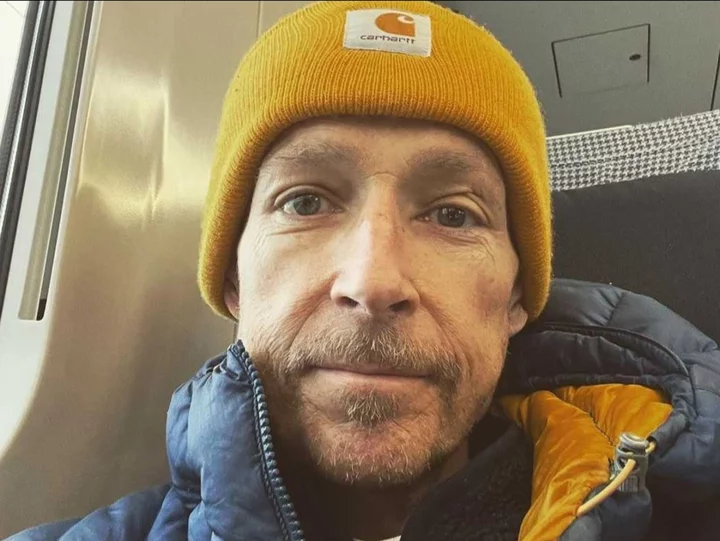
A Place In The Sun’s Jonnie Irwin admitted to hospital amid terminal diagnosis
Jonnie Irwin has revealed that he has been admitted to hospital as he deals with terminal cancer. The Escape to the Country presenter, 49, said in November that he “doesn’t know how long” he has left to live, after first being diagnosed with lung cancer in August 2020, which later spread to his brain. He went public with his diagnosis in November 2022, after keeping it a secret from his fans for more than two years. Since his announcement, Irwin has been keeping his social media followers up to date with his condition. In the latest update, the father-of-three revealed he has gone into hospital to be “monitored” but hopes to be released in time for a scheduled appearance at A Place In The Sun Live in London this weekend (2-4 June). He wrote in an Instagram post: “In hospital this week monitoring a changeover in my pain management regime.” “Fingers crossed I’ll be out in time to make an appearance on Sunday for this weekends @aplaceinthesunofficial LIVE event at @olympialondon in Kensington,” he continued. If he is released from the hospital and attends the event, Irwin will be joined on stage by fellow presenters Jasmine Harman, Ben Hillman and Laura Hamilton. He concluded the post: “Hope to see you there…x.” In a new podcast OneChat released last week, Irwin said that he was living under a “dark cloud” for the two years he hid his cancer from the world, adding that he kept his condition a secret so that he could continue working and “provide” for his family. Irwin and his wife Jessica have three children; three-year-old son Rex and two-year-old twins Rafa and Cormac. Elsewhere in the interview revealed that he had been close to death’s door “at least twice”, emphasising that he prefers to think of his situation as “living with cancer, rather than dying from cancer”. Irwin explained how he began to feel “alive” again after going public with his illness, but noted that didn’t mean his journey had been easy. “I have been close to death’s door, twice at least,” he said. He added: “You lose your memory, you lose your patience. I have got a very short temper. It’s not made me a better person, that’s for sure.” In March, Irwin gave a health update, telling The Sun: “I’m weak now, fragile and my memory is terrible… but I’m still here.” Read More Triathlete proudly shares ‘beautiful’ racing photo where she bled through swimsuit while on her period Parents defend Nick the Fairy Godmother’s apprentice at Disneyland after viral video Jodie Marsh takes swipe at Phillip Schofield years after heated This Morning clash 5 myths about lung cancer everyone needs to stop believing Jonnie Irwin says he’s been ‘close to death’s door twice, at least’ Jonnie Irwin says going public with cancer diagnosis was when he began ‘living again’
2023-06-01 14:58

Harrison Ford admits he’d be a ‘better parent’ if he was ‘less successful’
Harrison Ford has spoken candidly about how his successful Hollywood career has impacted his role as a father. The Indiana Jones star, 80, revealed some of his parenting regrets in a new cover story with Esquire published on 31 May. Speaking about his family, Ford admitted that he would “probably be a better parent” if he had a “less successful” career. “I can tell you this. If I’d been less successful, I’d probably be a better parent,” the Star Wars alum shared. He went on to reference a viral quote from his February interview with the Hollywood Reporter, in which he stated: “I know who the f*** I am.” “I accept my flaws and my failures – I don’t accept them, I own them,” he continued. “And certainly the more constant gardener is the better parent, and I’ve been out of town, up my own ass, for most of my life.” Harrison Ford is a father to five children. He shares sons Benjamin, 56, and Willard, 54, with his first wife, Mary Marquardt. He also has son Malcolm, 35, and daughter Georgia, 31, from his second marriage to Melissa Mathison; and his 22-year-old son Liam, whom he adopted after he married his current wife, Calista Flockhart. The couple have been married for 13 years ever since they first met at the Golden Globe Awards in 2002 when Ford was 60 years old, 22 years older than Flockhart at the time. He proposed to the Ally McBeal star in 2009 and they were married one year later. Ford and Flockhart recently celebrated Liam’s graduation from Amherst College in Massachusetts over the weekend. Ford was seen dressed in a black suit with a pale blue shirt and no tie, while the Supergirl star wore a white lace dress and a cream cardigan. Although Harrison Ford has kept most of his family life private, the action star previously spoke about being a father to his then nine-year-old son in an interview with The Independent. “I’ve got five kids in total, so it’s not my first rodeo,” he said in 2010. “Yeah, obviously I’m getting older but I don’t relate to it very much. It doesn’t interest me as something to dwell on.” “I have a nine-year-old kid at home. I feel like the father of a nine-year-old kid. My older children have taught me a lot about parenting. My first child was born when I was 25. I reckon I’m a little better at it now.” Read More Al Pacino, 83, ‘expecting his fourth child’ with 29-year-old girlfriend Harrison Ford and wife Calista Flockhart attend son Liam’s graduation Harrison Ford lovingly admires wife Calista Flockhart in ‘adorable’ viral photo: ‘Couple goals’
2023-06-01 06:26

Jetting off this summer? Doctors share essential in-flight health tips
Holidays are great – but travelling can take its toll on your body and mind, particularly when flying long distances. “When you consider that pressure, temperature and oxygen levels fluctuate in the aircraft, add in the fact that humidity levels are lower than sea level – it’s not surprising flying can upset some of your body’s normal functions,” says Dr Chun Tang, medical director and GP at Pall Mall Medical. “Not forgetting, most people feel varying degrees of stress before take-off too.” So, if your summer holiday is set to include a hefty flight, what are some of the key things to think about when it comes to health and wellbeing? Dehydration “Airplanes can dehydrate you because half of the air circulating in the cabin comes from the outside, and when you’re at a higher altitude there is hardly any moisture in the air,” says Tang. If you want to help mitigate the impact of dehydration while flying, consider what you eat and drink both before and during. “Eat something light, like a salad and fruit. Avoid salty fast food, especially before flying, as this can cause bloating and dehydration,” suggests Tang. “Many people like to have an alcoholic drink in the departure lounge prior to flying, but you are just dehydrating yourself further. Avoid coffee too and stick to fresh juices and water. “After you’ve flown, tempting as it is to go and get an alcoholic beverage, keep drinking water to restore hydration.” Germs Tang explains: “When you fly, you’re exposed to more germs because you’re near others – that’s why it’s common to catch a cold or sniffle following a flight. Your tray table, seatbelt and other surfaces that are frequently touched will also be covered with germs. “Carry a small bottle of hand sanitiser and cleaning wipes with you,” he suggests, “and wash your hands frequently during travel.” Sleep Jet-lag is a pain and can easily ruin the start and end of a trip. So, how can you mitigate its impacts and keep your sleep cycle solid? “Exposure to light is incredibly important for regulating your body clock. When it’s dark outside, you’re more likely to fall asleep,” says Tang. “If you’re travelling west to the USA or South America, for example, you should seek light in the evening time. If you’re headed east, then you want to restrict light exposure if you’re arriving at night-time and seek it out in the morning. “Studies show that blue light from your smartphone or tablet can keep you awake, so avoid these when you’re trying to get some sleep,” he adds. Ears Tang says another possible “side-effect of flying can be stress on your ears due to pressure changes in the cabin”. This is why it’s often advised that people avoid flying if they have an ear infection, for example.“When the outside pressure changes quickly during take-off and landing, you may feel your ears pop. Sometimes this imbalance can cause motion sickness because your brain is receiving conflicting messages,” says Tang. “Try swallowing or yawning to open the eustachian tubes [which connect the middle ear and throat] during take-off and landing.” Circulation Deep vein thrombosis (DVT) is a very real concern for many people when flying. These blood clots, which usually affect the legs, can be extremely serious. “One of the most common causes of DVT is prolonged periods of inactivity when travelling long distances,” says Professor Mark Whiteley, leading venous surgeon and founder of The Whiteley Clinic. “When people significantly reduce the activity in their legs, the blood flow becomes very sluggish in the deep veins – therefore putting people at a higher risk of a clot forming. “It is important to keep as active as possible when flying by regularly stretching and going for a walk up and down the cabin aisle, at least once per hour if it is a long flight,” he adds. “I would also advise wearing properly fitted flight stockings. This speeds up the flow of blood in the veins and therefore reduces the risks of the blood clotting.” Anyone can potentially get DVT, but if you have a history of blood clots or may be at increased risk, always speak with your doctor before travelling. What if I have a pre-existing condition? “If you have pre-existing health conditions, then it’s best to check with your GP on any specific aspects of flying that may impact you,” says Tang. “You’ll also need to ensure that you have purchased adequate travel insurance that will cover you should you require any medical attention while abroad.” Another important consideration is to make sure any medication you will need is stored in your hand luggage/carry-on bag, and not in the hold (in case it goes missing). Some countries may also have restrictions on certain medications – ensure you speak with your doctor well in advance of travelling. Read More Charity boss speaks out over ‘traumatic’ encounter with royal aide Ukraine war’s heaviest fight rages in east - follow live How do heterosexual celebrities become LGBTQ+ icons? More help with childcare costs for families on universal credit from end of June Menopause and menstruation guidance launched for workplaces to support employees
2023-05-31 22:58
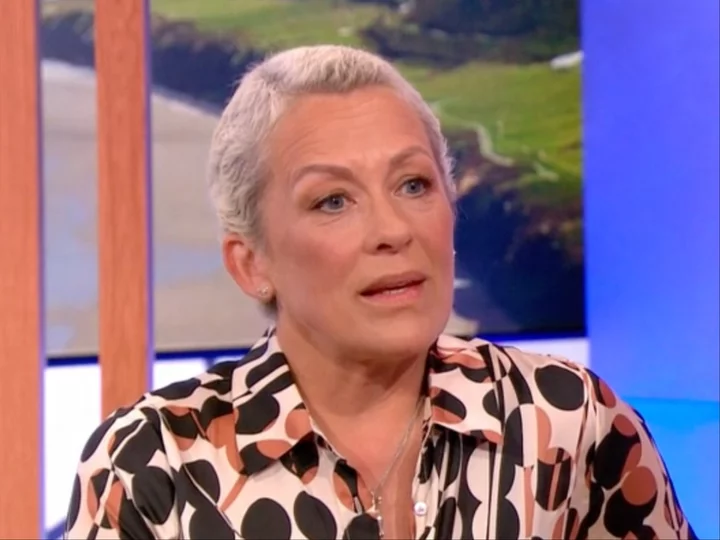
Sarah Beeny shares health update after all-clear from breast cancer
Sarah Beeny has said she is feeling happy and well after being given the all-clear from cancer by her doctors. The TV presenter and property expert, 51, was diagnosed with breast cancer in August last year. In April she was told she was all-clear from the disease. In recent months, Beeny has been working on a new Channel 4 documentary that follows her journey from diagnosis to treatment. Appearing on BBC‘s The One Show on Monday (29 May), the presenter said she “always feared” getting breast cancer after her mother died from the same cancer when Beeny was 10 years old. “When I got to 39, which is the age she died, I thought ‘Here we are.’ And then I got to 40 and thought, that’s weird!” she said. “And then I got to 50 and got the diagnosis.” “I’ve lived with this fear for such a long time,” she continued. “But once I realised how the treatment works, it’s not nearly as bad as the fear.” Appearing on Lorraine in April, Beeny said her cancer journey had been a “rollercoaster ride”. ​​“But I feel very fortunate that I had the diagnosis that I did, and that I live in 2023 and that I’m the age that I am. So many things I’m fortunate for, so I feel very blessed,” she said. Beeny, who received chemotherapy, said she would have to take medication for the next 10 years and remain “very vigilant”. “But, yeah, it’s been a weird ride that I wouldn’t wish on anyone else but I’m glad I did it rather than somebody else,” she added. Beeny has four children: Rafferty, Laurie, Billy and Charlie; and married her husband, artist Graham Swift, in 2003. Her family appears in her Channel 4 series Sarah Beeny’s New Life In The Country, which was filmed before her diagnosis. Sarah Beeny: Breast Cancer, My Family and Me will air on Monday 12 June on Channel 4 at 9pm. Read More College student goes viral after sharing her wild two hour commute everyday: ‘This is a journey’ Mother’s warning after viral TikTok hack left skin peeling from her face The ideal age gap for a relationship if you want it to last, according to experts Sarah Beeny shares health update after all-clear from breast cancer Breast cancer symptoms and survival rate as Amy Dowden diagnosed Signs and symptoms of breast cancer as Amy Dowden reveals diagnosis
2023-05-31 20:25
